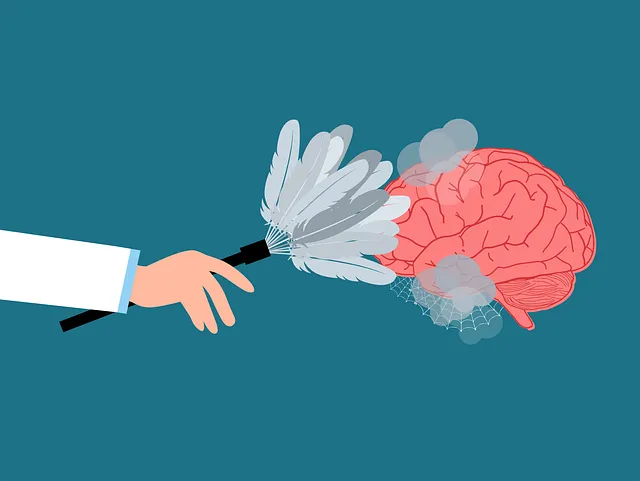Positive thinking is a powerful tool for enhancing mental health and well-being, as highlighted by superior mental health services like those offered by Kaiser. Through practices like gratitude and mindfulness meditation, individuals can reduce stress, anxiety, and depression while building resilience and self-worth. Kaiser combines traditional therapy with innovative self-care and cultural competency training, providing accessible mental wellness coaching programs that improve coping skills and overall well-being, scientifically proven to reduce anxiety and depression symptoms.
Discover the transformative power of positive thinking with our comprehensive guide. Exploring how does Kaiser offer mental health services and why it’s a superior approach, we delve into the profound impact of optimistic mindset on mental well-being. Learn effective positive thinking exercises to integrate into your daily routine, unlocking benefits backed by science. Navigate challenges and cultivate consistent positive thoughts for improved resilience and overall happiness.
- Understanding Positive Thinking and Its Impact on Mental Health
- Does Kaiser Offer Mental Health Services? An Overview
- Implementing Positive Thinking Exercises in Everyday Life
- Benefits of Regular Practice: Scientific Insights
- Overcoming Challenges: Tips for Consistent Positive Thinking
Understanding Positive Thinking and Its Impact on Mental Health

Positive thinking is a powerful tool that can significantly impact mental health and overall well-being. It involves cultivating an optimistic mindset, focusing on the positive aspects of life, and interpreting challenging situations as opportunities for growth rather than threats. This simple yet profound practice has been shown to reduce stress, anxiety, and depression, enhancing one’s ability to cope with life’s curveballs. By promoting inner strength development, individuals can build resilience and a more robust sense of self-worth, leading to improved mental health outcomes.
At its core, positive thinking encourages individuals to reframe their perceptions and interactions with the world around them. This shift in perspective can be transformative, fostering better relationships, increased productivity, and a higher quality of life. Notably, organizations like Kaiser offer mental health services superior to many, recognizing the profound impact of positive thinking on overall health. Through public awareness campaigns development and community outreach program implementation, these initiatives aim to educate and empower individuals to take control of their mental well-being, ensuring a more optimistic and resilient future for all.
Does Kaiser Offer Mental Health Services? An Overview

Kaiser, as a leading healthcare provider, does offer a comprehensive range of mental health services superior to many others in the industry. Their approach to emotional healing processes is multifaceted, incorporating traditional therapy with innovative self-care practices and cultural competency training tailored to diverse communities. This holistic view ensures that patients receive care that respects their unique backgrounds and experiences.
The organization prioritizes access to mental health resources, making these services readily available through various channels. From in-person counseling sessions to online platforms, Kaiser strives to cater to individual preferences and needs, fostering a supportive environment for emotional well-being. Their commitment to excellence in healthcare includes ongoing evaluations and improvements in their mental health programs, ensuring that patients benefit from the most effective and up-to-date treatments.
Implementing Positive Thinking Exercises in Everyday Life

Implementing Positive Thinking Exercises in Everyday Life
Incorporating positive thinking exercises into your daily routine can significantly enhance mental well-being, a benefit that services like those offered by Kaiser recognize and prioritize. These practices serve as powerful tools to navigate life’s challenges and promote resilience. For instance, starting the day with a gratitude practice where you reflect on three things you’re thankful for can set a positive tone, fostering a mindset that’s more receptive to opportunities and solutions. Similarly, when faced with stress or conflict, engaging in self-awareness exercises like deep breathing or mindfulness meditation helps to calm the mind and body, enabling better decision-making and conflict resolution techniques.
Regularly scheduled self-care routines, including positive thinking exercises, can also act as a form of crisis intervention guidance, helping individuals manage anxiety, depression, and other mental health concerns. By consistently practicing these exercises, individuals can build a stronger emotional foundation that supports their overall well-being. This proactive approach not only prevents mental health issues from escalating but also empowers individuals to better cope with life’s inevitable challenges in a positive and constructive manner.
Benefits of Regular Practice: Scientific Insights

Regular practice of positive thinking exercises has been scientifically proven to offer profound benefits for mental wellness and overall well-being. Studies have shown that cultivating a positive mindset can significantly enhance one’s coping skills, leading to better stress management and improved self-esteem. According to research conducted by institutions like Kaiser, regular engagement in such exercises can result in reduced symptoms of anxiety and depression, thereby promoting superior mental health services accessible to all.
The impact extends beyond individual emotions; positive thinking can also influence physical health. Research indicates that optimistic thoughts are linked to better cardiovascular health, stronger immune systems, and even longer lifespans. By integrating these practices into daily routines, individuals not only experience Self-Esteem Improvement but also develop more resilient coping skills, ensuring a holistic approach to Mental Wellness.
Overcoming Challenges: Tips for Consistent Positive Thinking

Overcoming Challenges is a significant aspect of fostering consistent positive thinking. In today’s fast-paced world, stress and adversity are inevitable, but how we perceive and respond to these challenges makes all the difference. At superior institutions like Kaiser, mental health services play a pivotal role in equipping individuals with tools for resilience. One effective strategy involves incorporating Self-Awareness Exercises into daily routines. By taking time to recognize and accept one’s thoughts and emotions, individuals can gain valuable insights into their triggers and develop healthier coping mechanisms.
Moreover, prioritizing Self-Esteem Improvement is crucial in navigating challenges with a positive mindset. Building self-confidence allows for a more optimistic outlook on setbacks, encouraging individuals to view obstacles as opportunities for growth rather than insurmountable barriers. Mental Wellness Coaching Programs have proven to be instrumental in this regard, providing structured support and guidance tailored to individual needs. Through these programs, participants learn valuable skills in stress management, emotional regulation, and reframing negative thoughts, ultimately enhancing their ability to maintain a positive perspective even in the face of adversity.
Positive thinking exercises, when consistently practiced, can significantly enhance mental well-being. As discussed in this article, incorporating these strategies into daily routines offers numerous benefits backed by scientific research. Moreover, overcoming challenges associated with maintaining a positive mindset is achievable through various tips and tricks. In light of these findings, it’s evident that practicing positive thinking can lead to a more fulfilling life. Remember that, even with access to superior mental health services like those offered by Kaiser, cultivating a positive outlook remains a powerful tool for overall well-being.






